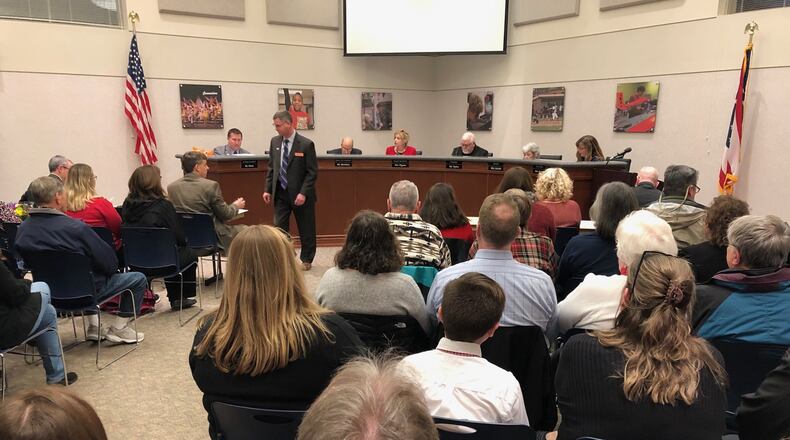FEBRUARY: Beavercreek school board approves budget cuts
The district adjusted to that vote by approving $2.6 million in cuts for next school year, including 15 teacher cuts, course reductions in foreign language, art and engineering, and higher pay-to-play fees. Superintendent Paul Otten has said if the district doesn’t pass the new levy, more cuts are expected this summer.
“For our budget, looking ahead at the five-year forecast and seeing what’s projected in the next three or five years, the need is there now,” associate superintendent Jason Enix said. “Even if there is a state funding increase, it wouldn’t overcome (the projected deficits).”
According to Beavercreek’s five-year forecast document, annual district revenues have risen from $83 million in 2016 to $86 million this year, but in that same span, spending has risen from $79 million to $91 million. The district projects to burn through its reserves near the end of the 2020-21 school year. Otten has said the new levy would merely maintain the status quo, not add new programs.
JANUARY: Superintendent explains proposed budget cuts
The separate renewal levy is a five-year, 1-mill facilities/equipment levy with no increase in cost to residents. But the focus is on the larger levy and the district’s finances, as the schools have been posting a levy fact of the day on Facebook.
Those posts have drawn mixed responses, with some residents saying the district has done what it can to be fiscally responsible, given limited funding from the state. As a wealthy district, Beavercreek gets less state funding per student than 94% of Ohio school districts.
But other residents argue that Beavercreek taxes are already too high, and with voters having recently rejected a levy, the district should make the cuts necessary to make do with the revenue they have.
NOVEMBER: Beavercreek levy fails, Career Center passes
Beavercreek Treasurer Penny Rucker pointed to Ohio’s school funding system, which asks higher-wealth districts to fund more of their own costs. Salaries and benefits are the main expenses in every school district, but Rucker said unfunded mandates are a key factor, such as special education. The district is legally obligated to provide special education services and spends $19.5 million per year to do so. But the state only provides $3.5 million in funding for that service.
“We have requirements that we have to meet (in special education) and if you’re not meeting it, you can be in due process hearings or going to court because … the student isn’t receiving the ‘free and appropriate public education’ that they’re entitled to,” Enix said. “And you’ll lose that one every time. There is no option.”
Given inequities in Ohio schools, Enix said Beavercreek really focuses on how they compare with the districts the state says are most similar to them in size, economics and demographics. Compared to their 10 most similar districts (a list that includes Centerville, Dublin, Mason and Lakota), Beavercreek ranks third-best in state test performance, gets the third-least state funding per pupil, and is exactly in the middle in spending per pupil.
RELATED: School levies put focus on state funding fight
“To be in alignment or lower (in spending), that helps tell the story of how we are pretty fiscally responsible,” Enix said. “When you can talk about yourself against the Dublins and the Lakotas and Centervilles and others – that we are not out of alignment with what other very well-respected districts are doing, I think it helps to tell our story.”
Rucker said Beavercreek schools made sure to proceed with budget cuts before asking residents again for a tax increase. But she said that’s no guarantee of support.
“You hear, ‘Those top-echelon wealthy (communities), they’ve got more money, they’re going to fund their kids no matter what happens,’ ” Rucker said. “But there are a lot more fixed income individuals out there, and I think there is a little bit of a change happening when you have the Baby Boomers being in retirement.”
RELATED: Seven local school districts ask for tax increases
Public meeting
Beavercreek schools will host a public session about school funding and the May 7 levies at 6 p.m. Thursday, May 2, in the Beavercreek High School auditorium.
About the Author

